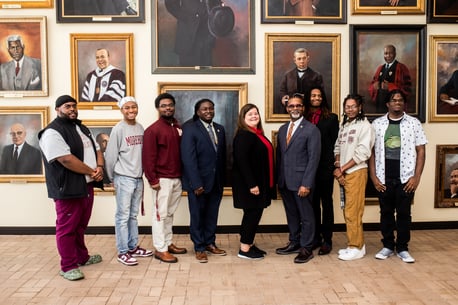Morehouse College has partnered with Region 4 of the U.S. Environmental Protection Agency (EPA) to address critical environmental justice and sustainability issues affecting Black communities. This partnership aligns with Morehouse’s unwavering commitment to social justice and fostering leadership and service among its students.The collaboration builds upon the successful launch of the Morehouse College Environmental Justice and Sustainability Program last year. Through this partnership, Morehouse and EPA will work together to identify and address environmental disparities that Black communities face, promote sustainable practices that benefit both the environment and human health and empower students with knowledge and skills to become environmental advocates.
 On Monday, April 8th, EPA Region 4 officials visited Morehouse College’s African American Hall of Fame for an official signing ceremony. The event included welcome remarks by Morehouse College Provost Kendrick Brown and Acting Regional Administrator Jeaneanne Gettle, introductions of staff and students from both organizations, and a roundtable discussion.
On Monday, April 8th, EPA Region 4 officials visited Morehouse College’s African American Hall of Fame for an official signing ceremony. The event included welcome remarks by Morehouse College Provost Kendrick Brown and Acting Regional Administrator Jeaneanne Gettle, introductions of staff and students from both organizations, and a roundtable discussion.
EPA Region 4 serves eight states and six tribal governments in the Southeast, including Alabama, Florida, Georgia, Kentucky, Mississippi, North Carolina, South Carolina, and Tennessee. The region focuses on protecting human health and the environment through various programs and initiatives.
This partnership between Morehouse College and EPA Region 4 is a significant step towards addressing environmental justice and sustainability issues that disproportionately affect Black communities.
Special thanks to Kendrick Brown, Provost and Senior Vice President of Academic Affairs; Undria Stalling, Chief Financial Officer and Senior Vice President of Business and Finance; Triscia Hendrickson, Associate Provost for Research & Student Training; and Ethell Vereen, Assistant Professor of Biology and Director of the Environmental Justice and Sustainability Program for making this partnership possible.
By working together, we can create a more equitable and sustainable future for all.
